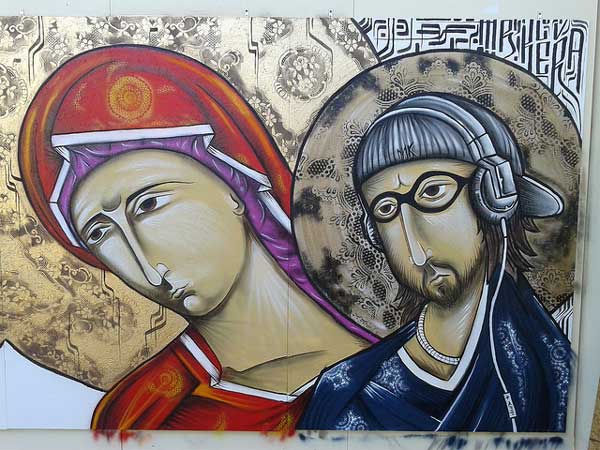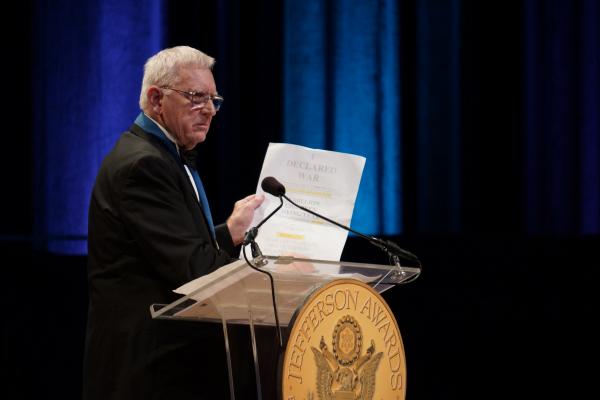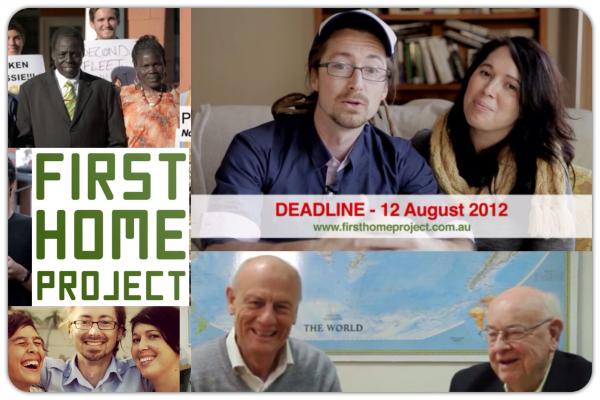The Association for Unmanned Vehicle Systems International is holding a convention this week in Las Vegas, with an expected 8,000 attendees, 500 exhibitors, and representatives from 40 countries. The Las Vegas Review-Journal columnist John L. Smith writes this morning that on Sunday, Franciscan Father Louis Vitale and CODEPINK co-founder Medea Benjamin were informed their attendance was not desired as they were attempting to secure convention credentials. Smith explains:
“For Vitale, who served in the Air Force before joining the Franciscans, the advanced technology hasn't translated into cleaner combat. The much-touted precision of the drone aircraft has kept American military out of harm's way, but it hasn't eliminated the high price of civilian casualties in the war zones.
To many, this is part of the price paid to defeat a treacherous enemy and maintain our national security. To Vitale, Benjamin and their colleagues, it's too great a price. And then he asks, "What is the impact on the people, what is the impact on our own people?"
The priest believes the incidents of predator operators suffering from post-traumatic stress disorder will be epidemic. His own experiences are anecdotal, he admits, but his conversations with British and U.S. military drone operators have been deeply troubling. Those onboard cameras not only spot suspected enemy targets, he notes, but they also reveal the damage wrought in unprecedented detail.”
From The Los Angeles Times:
Escalating violence in Syria has shut down pharmaceutical plants, piling another worry onto the woes facing the Syrian people: Severe shortages of medicine.
The World Health Organization warned Tuesday that growing clashes between forces loyal to President Bashar Assad and opposition fighters around the cities of Damascus, the capital, and Aleppo have damaged and closed many of the local plants that make the vast majority of medicines. The country produces most of its own pharmaceuticals.
Drugs to treat tuberculosis, hepatitis, diabetes and other maladies are urgently needed, along with chemical reagents to screen blood before it can be used for infusions for trauma and surgery patients, according to reports received by the United Nations agency.
Learn more here
Writing for Salon, Adam Lee argues:
Despite their shared belief in God, the religious left actually has less in common with the religious right than it does with progressive, nonreligious Americans. But by choosing to play up the importance of religion and religious language, the liberal churches undermined their natural allies outside the pews, while strengthening those who insisted most loudly and most vehemently that society should be run according to the dictates of the Bible. This strategic blunder has guaranteed the relative isolation and diminished influence of the Christian left in the face of a rising tide of religious conservatism.
Read more here
Conor Friedersdorf writes for The Atlantic:
Since 9/11, many Americans have conflated terrorism with Muslims; and having done so, they've tolerated or supported counterterrorism policies safe in the presumption that people unlike them would bear their brunt. (If Mayor Bloomberg and the NYPD sent officers beyond the boundaries of New York City to secretly spy on evangelical Christian students or Israeli students or students who own handguns the national backlash would be swift, brutal, and decisive. The revelation of secret spying on Muslim American students was mostly defended or ignored.)
In the name of counterterrorism, many Americans have given their assent to indefinite detention, the criminalization of gifts to certain charities, the extrajudicial assassination of American citizens, and a sprawling, opaque homeland security bureaucracy; many have also advocated policies like torture or racial profiling that are not presently part of official anti-terror policy.
What if white Americans were as likely as Muslims to be victimized by those policies? What if the sprawling national security bureaucracy we've created starts directing attention not just to Muslims and their schools and charities, but to right-wing militias and left-wing environmental groups (or folks falsely accused of being in those groups because they seem like the sort who would be)?
Read more here
Over the weekend, Salon published an excerpt from Mike Lofgren's new book, The Party Is Over:
Having observed politics up close and personal for most of my adult lifetime, I have come to the conclusion that the rise of politicized religious fundamentalism may have been the key ingredient in the transformation of the Republican Party. Politicized religion provides a substrate of beliefs that rationalizes—at least in the minds of its followers—all three of the GOP’s main tenets: wealth worship, war worship, and the permanent culture war.
Religious cranks ceased to be a minor public nuisance in this country beginning in the 1970s and grew into a major element of the Republican rank and file. Pat Robertson’s strong showing in the 1988 Iowa presidential caucus signaled the gradual merger of politics and religion in the party. Unfortunately, at the time I mostly underestimated the implications of what I was seeing. It did strike me as oddly humorous that a fundamentalist staff member in my congressional office was going to take time off to convert the heathen in Greece, a country that had been overwhelmingly Christian for almost two thousand years. I recall another point, in the early 1990s, when a different fundamentalist GOP staffer said that dinosaur fossils were a hoax. As a mere legislative mechanic toiling away in what I held to be a civil rather than ecclesiastical calling, I did not yet see that ideological impulses far different from mine were poised to capture the party of Lincoln.
Read more of the excerpt here
Not only has interfaith meal packaging been repeated multiple times in my community, but this weekend I’ve also heard the stories of hundreds of secular and faith-based communities mobilizing together to address issues of world hunger. Representatives of one church-based organization described their collaboration with a local Buddhist community that contributes rice to the packaging efforts. Last month at Kids Against Hunger headquarters, members of a mosque, a church, and a synagogue came together to produce over 8,000 meals — an activity that they hold quarterly with a shared meal and socializing.
These stories of interfaith collaboration are inspiring, but too rare.
My friend Eboo Patel says that “if we don’t find a way to make faith a bridge of cooperation and not a bomb of destruction, then we’re in trouble.”
When meal-packaging projects become collaborations between communities that have historically clashed, stereotyped, judged, or ignored each other, then bridges are being built instead of bombs. And not only do hungry kids need food, but this is a time when our increasingly religiously diverse country needs to learn to build bridges.
A recent study by The National Conference of State Legislatures shows that in 2012, states passed fewer immigration laws than previous years.
“U.S. state legislatures passed fewer immigration measures this year because lawmakers' priorities shifted to balancing budgets and U.S. courts were weighing how much authority states have to enforce immigration laws, according to a study released on Monday.”
Read full story HERE.
Last Sunday, the Catholic singer/songwriter/poet/theologian Pádraig Ó Tuama (who hails from County Cork, Ireland), took to Revolution NYC's "barstool pulpit," to share stories, poems, and wisdom from the spiritual journey — his, yours, ours.
Listen to Ó Tuama's talk inside the blog ...
In the Australian city where I live, there is a housing crisis.
Only 2 percent of rental properties are vacant. The mining boom has seen a huge increase in the number of renters and this additional competition has left parties outbidding each other to lease the few rental properties on the market.
In this environment, immigrants, generally, and refugees in particular, struggle to access affordable accommodation, let alone accommodation close to employment opportunities or community services.
In the community I helped found and where I have spent the last eight years — going through the highs and lows of radical hospitality, direct action, gardening, praying, and cups of tea — we feel called to leave.
 ROME — Even in the heartland of global Catholicism, a life-size Madonna on a street wall is an uncommon sight — especially if you leave the cobblestone alleyways of the historic center for the drab concrete of the city's former industrial districts.
ROME — Even in the heartland of global Catholicism, a life-size Madonna on a street wall is an uncommon sight — especially if you leave the cobblestone alleyways of the historic center for the drab concrete of the city's former industrial districts.
But bringing sacred art back to Rome's run-down streets is exactly what a street artist known as Mr. Klevra has set out to do.
Mr. Klevra, a 34-year old Italian artist and a committed Catholic, paints Madonnas and other saints on thin paper posters and then glues them onto walls under the cover of darkness.
"I love the adrenaline of putting up the paintings while hiding from the police," he said. "I love the randomness of having your art torn down after five minutes or see it stay in its place for years and years.''
Mr. Klevra is his artist's name — like many street artists, he doesn't give out his real name, and prefers to keep his identity secret, even shielding his face from cameras.
In his paintings, he combines the millennia-old techniques of Eastern Orthodox iconography with modern tools such as spray paint and Uni Posca pens. Pop culture references sometimes find their way into his work, such as a Madonna with the motto "Only after disaster can we be resurrected,'' a line from American author Chuck Palahniuk's novel, Fight Club.



